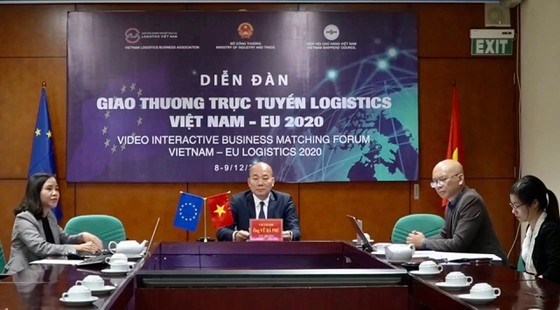
Great potential from the EU for Vietnam’s logistics industry
Speaking at the forum, Mr. Vu Ba Phu, Director of Vietnam Trade Promotion Agency, said that the EU is an important partner of Vietnam in the fields of trade cooperation. Trade relations between Vietnam and the EU over the past time have developed rapidly and effectively. In the first ten months of this year alone, although Vietnam's export turnover to the EU slightly decreased by 3.8 percent compared to the same period last year, it still reached a high level, with US$33.23 billion. Meanwhile, Vietnam's imports from the EU increased 3.1 percent over the same period last year and reached $12.42 billion.
Currently, the EU is one of the three largest export markets for Vietnam, besides the US and China.
According to Mr. Vu Ba Phu, the EU-Vietnam Free Trade Agreement (EVFTA), which takes effect from August 1 this year, has been creating a strong boost for the development of trade between Vietnam and the EU, bringing about favorable factors for the development of the logistics sector.
Over the past time, Vietnam's logistics industry has a high growth rate of 13-15 percent. Currently, Vietnam has about 4,000 logistics enterprises, which include warehouse services, forwarding, and transportation.
Mr. Tran Thanh Hai, Deputy Director of the Department of Import and Export, said that logistics is becoming an economic sector attracting the attention of the Government of Vietnam. The promulgation of Decision No.200/QD-TTg by the Prime Minister on enhancing competitiveness and development of logistics services until 2025 opens a new stage for the development of logistics in Vietnam when setting out comprehensive and synchronous solutions to improve infrastructures, develop markets, as well as to improve human resources for this field.
The development of the logistics industry would also create conditions for Vietnam to quickly become a new manufacturing hub in the region, with high labor productivity and good competitiveness, Mr. Tran Thanh Hai emphasized.
New difficulties arise
Besides the above advantages, there are also many difficulties in cooperation in logistics between Vietnam and EU countries.
Mr. Vu Ba Phu said that, in the context of the Covid-19 pandemic, two-way trade between Vietnam and the EU has been facing many challenges, including difficulties from some logistics activities that cannot take place as usual.
For instance, over the past time, some logistics services for goods moving between Vietnam and the EU have become expensive and scarce. Enterprises also have to meet some new requirements and conditions because the administrative procedures on import and export and the international goods control process of the EU have already changed.
Mr. Nguyen Tuong, Deputy General Secretary of the Vietnam Logistics Business Association (VLA), also pointed out the challenges of Vietnamese logistics enterprises, such as shortcomings in service quality, management skills, information technology application, and human resources. The main difficulties in digital transformation for logistics service providers currently include financial situation, human resources, and selection of suitable technology.
According to Mr. Vu Ba Phu, to make two-way trade exchange between Vietnam and EU more efficient, optimizing the quality and implementation of logistics services to serve import and export goods of Vietnam and the EU in a new economic condition under the impact of the Covid 19 pandemic is one of the necessary solutions.
The MoIT said that the relevant authorities under the ministry are continuing to review administrative procedures on import and export in order to promote export, create favorable conditions, and effectively support import-export enterprises and logistics service enterprises.
Vietnam also encourages enterprises to focus on investing in logistics infrastructure, increasing the connectivity of means of transport, and improving the capacity of providing logistics services by applying digitization of operational processes.
Mr. Tran Thanh Hai also suggested that EU enterprises can participate in investing in logistics infrastructure in Vietnam, as well as participate in deploying technology application activities in logistics, promoting the training of human resources for the logistics sector and cooperation in new fields, such as urban logistics, circular logistics, and green logistics.
Hedging risks
Sharing with Vietnamese enterprises about the opportunity to cooperate with outstanding logistics services of the Netherlands, Mr. Sjaak de Klein, Senior Manager of Supply Chain Solutions Asia, Holland International Distribution Council (HIDC), said that Port of Rotterdam is the largest port in Europe, with more than 200 deep-water terminals. Especially, this port optimizes the supply chain through digitization. Besides, Amsterdam Schiphol Airport is the second-best direct connectivity airport in the world.
Mr. Sjaak de Klein also committed that HIDC is willing to advise on the European supply chains for Vietnamese logistics enterprises.
In another perspective, Mr. Gilbert Canameras, President of Francorisk, a French foreign trade consultant, said that risk assessment and handling is the top requirement for any enterprise because when the enterprise participates in a constantly changing world, the risks will increasingly heighten.
Enterprises need to equip with a risk forecasting system to minimize risks. With each risk, such as risk from internal factors (failure of machines and people) to objective factors, enterprises need to determine which ones are acceptable and which ones are unacceptable and take appropriate measures to minimize them.
























